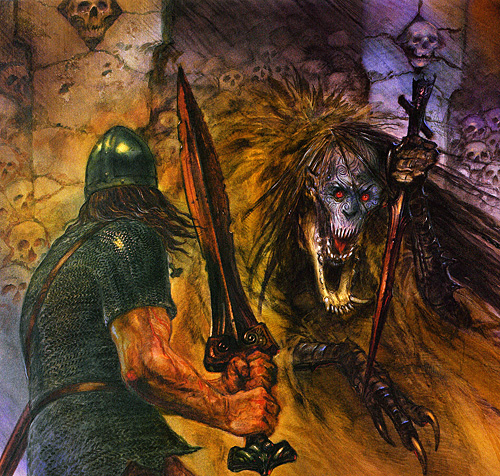If you want to see Grendel’s Mother in action, look at current events in the Middle East. Even Beowulf would have difficulty defeating this incarnation of the monster.
I teach my students that the monsters in Beowulf are symbolic articulations of various destructive human angers. Grendel anger, the hot rage of those who feel left out, passed over, or otherwise aggrieved, drives many of our mass killers. The Dragon is the frozen rage of the deeply depressed, which is capable in an instant of spouting fire and leveling everything around it when it feels encroached upon. And then there is Grendel’s Mother, the grieving anger of those who have lost someone precious.
After seeing an ISIS propaganda video of a captured Jordanian pilot being burned alive, Jordanians are in the grip of this last anger. Just as Grendel’s Mother feels compelled to make someone pay for the death of her son, so Jordan immediately executed some of the terrorists that they had contemplated trading for the pilot, and they have upped their aerial bombardments.
It’s not only Jordan that is dancing with this monster. Americans have been fantasizing about their own scorched earth response to ISIS beheading American captives.
Anglo-Saxon society understood such intractable anger well because it had a significant problem with blood feuds. One encounters multiple stories in Beowulf of kings either engaging in such feuds or trying to tamp down the anger that the feuds have unleashed. Take, for instance, King Finn of the Frisians, who first tries diplomatic marriage and then anti-hate laws to defuse a powder keg of hate. Neither approach works.
Finn at first tries to ensure peace with the Danes by marrying the Danish princess Hildebuhr. Fighting still breaks out between the Danes and the Frisians, however, and Hildebuhr sees both her Danish brother and her Frisian son killed in the battle. Then, because neither side triumphs, the two warring sides must figure out a way to coexist. Finn forbids his men to provoke King Hengest and his Danes:
With oaths to Hengest
Finn swore
openly, solemnly,
that the battle survivors
would be guaranteed
honor and status.
No infringement
by word or deed,
no provocation
would be permitted.
Unfortunately, these well intentioned efforts fail as emotions run too deep. The Danes take to arms again:
The wildness in them
had to brim over.
The hall ran red
will blood of enemies.
Finn was cut down…
One can think of the current situation as a continuing blood feud brought about by grieving anger. When the U.S., grieving over 9-11, attacked Saddam Hussein (not that he had anything to do with it), we helped propel a number of Hussein’s Baathist forces into their own grieving anger. Some of these people are key figures in ISIS.
Meanwhile the Shiites, who we helped to power and who had their own scores to settle with the Sunnis, unleashed their own set of Grendel’s Mothers. Revenge killing leads to revenge killing leads to revenge killing. Invading Iraq was insane because we needlessly introjected ourselves into someone else’s blood feud.
As a hero, Beowulf finds productive ways to deal with the angers that rip societies apart. Is there anything that he can teach us?
First, we learn what does not work. When Beowulf is battling Grendel’s Mother at the bottom of the her monster-infested lake, he learns than sword blows have little impact. In other words, to respond to ISIS with mere sword blows (or bombs) is ultimately ineffective.
Beowulf also learns that the iron grip that worked against Grendel will not work against grieving anger. An impressive show of strength and an iron will are not enough. ISIS is not going to back down.
What does work for Beowulf, however, is the invocation of a higher ideal, represented by the great sword that he finds in the underwater hall. This sword has been forged by giants in the golden age before the flood and represents a higher warrior authority. Beowulf uses this sword to kill the monster.
Our own version of such authority, I think, is a political solution. Yes, swords must still be involved, but ISIS can ultimately be stopped only if the area’s nations come together to oppose it and if the Iraqi Shiites move beyond sectarianism and include Sunnis in the government.
Delicate diplomacy will be critical so don’t listen to those blustering war hawks that fantasize hacking away with swords. Beowulf is impressive because he refuses to be overwhelmed by the murky depths of the Mother’s anger. He maintains his poise even when things are at their worst.
In other words, like Beowulf we need to keep our heads, which is awfully hard when we see people being beheaded and burned alive. No one said that being an epic hero is easy.
Do our leaders have it in them to be Beowulfs? Do we?

One Trackback
[…] February, when fury against ISIS was burning hot following the beheading of American prisoners, I cautioned against becoming Grendel’s Mother. That caution is even more necessary today following the […]